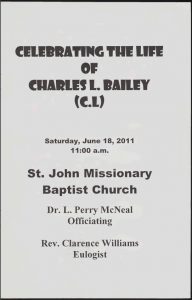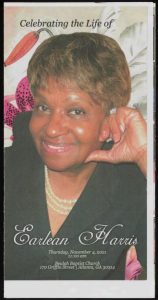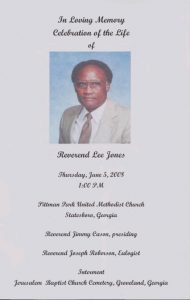ATHENS, Ga., June 8, 2023 — Selected by statewide cultural heritage stakeholders and funded by the DLG’s competitive digitization grant program, this collection is the Pitts Theology Library’s first collaboration with the DLG and is available here: Georgia Conferences of the Methodist Episcopal Church Collection.
The collection is comprised of bound conference journals dating from 1867 to 1939, produced by the Methodist Episcopal Church (MEC), a Northern church that established missions in Georgia during the Reconstruction Era, working closely with the Freedman’s Aid Society to find schools and colleges for the formerly enslaved while integrating the then-separate Black and white churches into the same conference. MEC churches were established in both rural and urban areas throughout the state.
The conference journals contain the minutes, reports, and statistics of the Methodist Episcopal Church and its individual congregations throughout the state of Georgia. They present value for researchers interested in the history of religion and race in Georgia, genealogical records of the clergy, the disparity between Black and white congregations, and other statistical data. The materials are useful for genealogists, scholars of Methodism, and historians of Georgia during the Reconstruction Era as well as the late-nineteenth and early-twentieth centuries.
Thomas Elliott, Jr., D.Min., associate professor in the practice of practical theology and Methodist studies and the director of Contextual Education II, Teaching Parish, and Internships Candler School of Theology, Emory University, defines the importance of digital access to this content:
“This particular subset of Methodist Episcopal Church (MEC) journals, 1867-1925, documents an important period in Georgia Methodism spanning from the Reconstruction Era to the period preceding the unification of the MEC with two other Methodist denominations. As a lifelong Methodist and Elder in the North Georgia Conference of the United Methodist Church, these journals significantly contribute to my own denomination’s history despite the relatively small size of the MEC Georgia conferences. These materials are essential tools for researching Methodist history, and having them more accessible to my students and the wider public further helps preserve the Methodist tradition. I know I speak for my “Methodist at Candler” colleagues in saying that interaction with these types of primary sources is a significant part of the educational experience in Methodist Studies at Candler.”
[View the entire collection online]
###
About the Pitts Theology Library
Pitts Theology Library, one of Emory University’s six instructional libraries, holds a distinguished collection of theological materials and is one of the premier theological libraries in North America. Supporting the students and faculty of Candler School of Theology at Emory University and researchers from around the world, Pitts is home to superb collections in theology and cognate disciplines, housed in a new state-of-the-art facility and served by a highly trained professional staff. For more information, visit pitts.emory.edu.
Image courtesy of Pitts Theology Library
Title: Minutes of the Seventh Session of the Georgia Annual Conference of the Methodist Episcopal Church held at Atlanta, Ga., beginning October 15th, 1873
https://dlg.usg.edu/record/emt_gcmec_8354
Description: The minutes of the 7th Georgia Annual Conference of the Methodist Episcopal Church held in Atlanta, Georgia, on October 15-21, 1873.
Image courtesy of Pitts Theology Library
Title: Journal of the Sessions of the Georgia Annual Conference of the Methodist Episcopal Church from the Reorganization, as the Georgia Mission Conference of the Methodist Episcopal Church at Atlanta [on] October 10, 1867, by Bishop Davis W. Clark
https://dlg.usg.edu/record/emt_gcmec_8390
Description: The journal of the Georgia Conference of the Methodist Episcopal Church from its reorganization as the Georgia Mission Conference in 1867 through the split of the Georgia and Savannah Conferences in 1897.


![Journal of the Sessions of the Georgia Annual Conference of the Methodist Episcopal Church from the Reorganization, as the Georgia Mission Conference of the Methodist Episcopal Church at Atlanta [on] October 10, 1867, by Bishop Davis W. Clark](https://mcusercontent.com/344ecc2c1b225f98f8389ce71/images/0a989d10-d294-a70d-c06d-684c3c016115.png)



